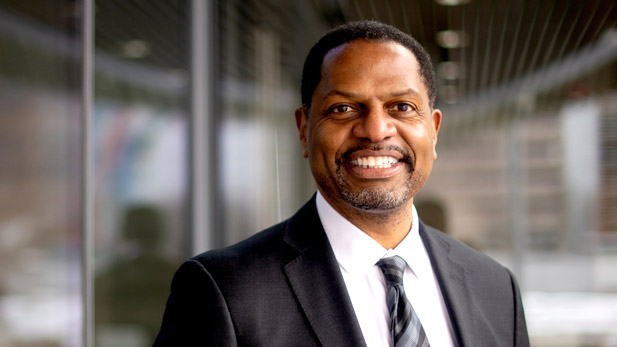National Advocate for Diversity and Inclusion in Engineering Karl Reid to Give Commencement Address

Northeastern University’s Chief Inclusion Officer Karl Reid, PhD, also is director of the National Science Foundation-funded Engineering PLUS Alliance and formerly was executive director of the National Society of Black Engineers.
Respected national advocate for diversity and inclusion in engineering, writer, educator and engineer Karl Reid, EdD, will be the distinguished speaker for Rose-Hulman’s 2022 Commencement on May 28. He also will be awarded an honorary engineering doctorate during the Institute’s 144th graduation event.
Reid is the chief inclusion officer at Northeastern University. He also is the director of the National Science Foundation-funded Engineering PLUS Alliance, a national effort to make engineering education more inclusive.
After earning bachelor’s and master’s degrees in materials science and engineering from Massachusetts Institute of Technology where he was a Tau Beta Pi Scholar, Reid worked in the computer industry for 12 years in product management, marketing, sales and consulting. His Doctor of Education came from Harvard University, with his dissertation exploring the interrelationship of race, identity and academic achievement for African American males in college.
Reid joined Northeastern, a global research university, in 2021 after serving seven years as the executive director with the National Society of Black Engineers (NSBE). In this role he visited Rose-Hulman to help the student chapter and Institute officials expand diversity recruitment and make the college more inclusive to underrepresented students seeking careers in science, engineering and mathematics.
“I am thrilled to return to Rose-Hulman, this time as the Commencement speaker, and am honored to be awarded a distinguished honorary degree,” said Reid. “Our nation and the world will benefit from the unique knowledge, skills, and lived experiences of Rose-Hulman graduates, and I'm delighted to celebrate this new beginning with the Rose-Hulman community.”
Rose-Hulman President Robert A. Coons stated, “We’re looking forward to welcoming Dr. Reid back to campus to provide further encouragement and advice during this special day for our graduates and their families and friends, along with our dedicated faculty and staff.”
Coons added, “We have made significant strides forward as an institution in areas of diversity and inclusion in the years since Dr. Reid’s last visit to campus, but we recognize the work still to be done both here and in the STEM fields at large. I think his insights will prove beneficial not only for this year’s graduating class but also for us as administrators and educators, as we implement Rose-Hulman’s short- and long-term strategic plans.”
Reid joined NSBE after serving as senior vice president for research, innovation and member college engagement at the United Negro College Fund (UNCF), where he oversaw new program development, research and capacity building for the organization’s 37 historically black colleges and universities. He previously worked in positions of progressive responsibility to increase diversity at his alma mater, MIT, which he left as associate dean of undergraduate education and director of the Office of Minority Education. He also led MIT’s engineering outreach programs.
As a certified diversity professional Reid has been a leading voice in advocating for increased college access, opportunity and success for low-income and minority youth. He also has become a frequent contributor to the national diversity engineering dialogue.
Rose-Hulman Provost Rick Stamper, PhD, said, “Dr. Reid’s successful book ‘Working Smarter, Not Just Harder: Three Sensible Strategies for Succeeding in College … and Life’ has provided guiding principles for thousands of college graduates in all major courses of study. And his 50K Coalition is striving to produce 50,000 diverse engineering graduates annually by 2025. I’m looking forward to the insight that he’ll pass along to our students, faculty and staff.”
A native of New York, Reid sits on the National Council for Inclusive Innovation with the United States Patent and Trademark Office; Committee on Advancing Anti-racism, Diversity, Equity and Inclusion in STEM Organizations with the National Academy of Sciences, Engineering and Medicine (NASEM); Grand Challenges Scholars Program Advisory Council; American Society for Civil Engineers’ Industrial Leaders Council; and advisory board of the American Council of Engineering Companies Research Institute.
Reid also served on the NASEM’s Committee on Addressing the Underrepresentation of Women of Color in Technology, deans’ advisory cabinets for Harvard’s School of Engineering and Applied Sciences and University of Michigan’s College of Engineering. He has memberships in the National Association of Diversity Officers in Higher Education and Society for Diversity.